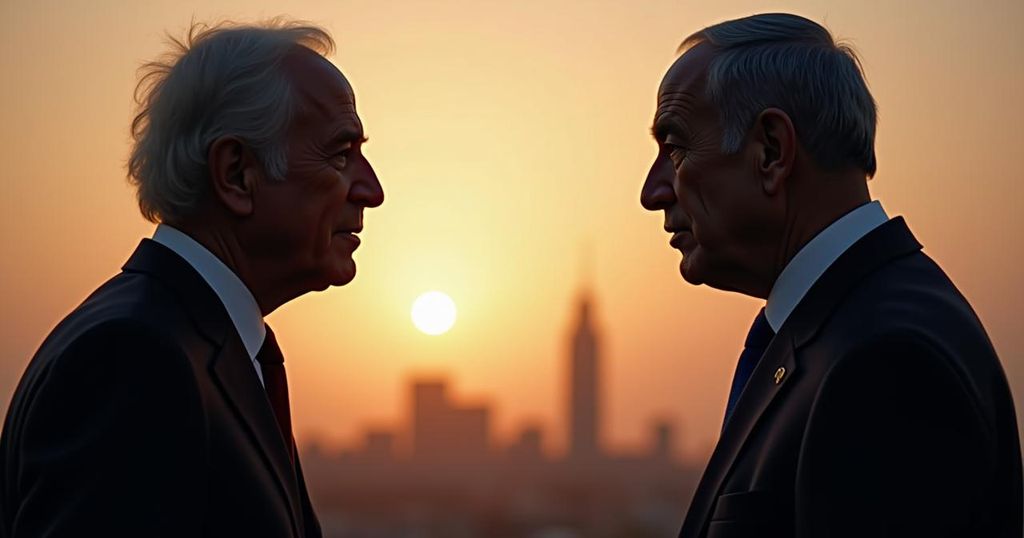President Biden recently addressed concerns about Israeli Prime Minister Netanyahu’s actions regarding a Gaza ceasefire, expressing uncertainty about whether these actions could be tied to influencing the upcoming US elections. He emphasized his administration’s strong support for Israel while noting frustrations over Netanyahu’s reluctance to negotiate. The relationship between Biden and Netanyahu appears strained, contrasting with Netanyahu’s previous rapport with Donald Trump, as polls reflect potential electoral challenges for Biden amid escalating violence in the region.
In a recent press briefing, President Joe Biden addressed concerns regarding the behavior of Israeli Prime Minister Benjamin Netanyahu with respect to ongoing diplomatic negotiations in Gaza. When queried about whether Netanyahu might be delaying a ceasefire agreement to influence the upcoming United States elections, Biden stated, “Whether he’s trying to influence the election, I don’t know but I’m not counting on that.” Biden underscored his administration’s unprecedented support of Israel, remarking, “No administration has helped Israel more than I have. None, none, none,” urging Netanyahu to acknowledge this alliance. Some Democratic leaders have expressed skepticism regarding Netanyahu’s responsiveness to Biden’s calls for a ceasefire and a resolution concerning hostages, suggesting a possibility that Netanyahu’s actions could be strategically linked to the November election outcomes. Democratic Senator Chris Murphy articulated this sentiment, suggesting that observations of Israel’s actions could be read as interconnected with the American electoral landscape. As the situation in the Middle East exacerbates, polling indicates that Biden’s approval ratings have suffered, particularly among Arab-American voters, raising concerns for the Democratic Party’s fortunes in the forthcoming elections. The Biden administration has persistently sought a diplomatic resolution between Israel and Hamas, though optimism appears to be waning. In response to inquiries regarding recent escalations, Biden suggested that Israeli military actions, including potential strikes in Iran, have yet to be finalized, emphasizing the need for cautious deliberation among Israeli leaders concerning their military strategy in the region. This evolving relationship stands in sharp contrast to Netanyahu’s previous rapport with former President Donald Trump, highlighting a significant shift in US-Israel dynamics. As violence continues in Gaza and Lebanon, the prospect for a diplomatic resolution before the election becomes increasingly tenuous, compounding the complexities facing both Biden and the Democratic Party in the context of Middle Eastern geopolitics.
The diplomatic relationship between the United States and Israel has long been characterized by mutual support, particularly in military and economic arenas. However, recent events have revealed strains in this relationship, particularly as Israel continues its military operations in Gaza while a significant focus on achieving a ceasefire persists. Concerns among Democrats regarding Netanyahu’s perceived inaction and the geopolitical ramifications of ongoing violence have become increasingly vocal, influencing internal party dynamics as the United States approaches an election period. The Biden administration’s efforts to broker peace have faced challenges amidst worsening violence, complicating electoral prospects for Democratic candidates amid shifting public opinion.
In summary, President Biden’s recent comments highlight a complex interplay of diplomatic negotiations and electoral politics as relations with Israel’s leadership evolve. While the administration continues to pursue a ceasefire agreement amid rising violence, the implications of Netanyahu’s actions on American politics remain uncertain. This evolving dynamic could have significant consequences for the Democratic Party’s performance in the approaching elections, particularly as voters react to developments in the Middle East.
Original Source: www.bbc.com







